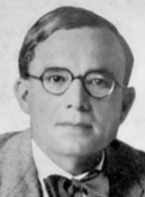
Aldous Leonard Huxley was an English writer and philosopher. His bibliography spans nearly 50 books, including novels and non-fiction works, as well as essays, narratives, and poems.
Polygamy is the practice of marrying multiple spouses. When a man is married to more than one wife at the same time, it is called polygyny. When a woman is married to more than one husband at the same time, it is called polyandry. In sociobiology and zoology, researchers use polygamy in a broad sense to mean any form of multiple mating.

Brave New World is a dystopian novel by English author Aldous Huxley, written in 1931 and published in 1932. Largely set in a futuristic World State, whose citizens are environmentally engineered into an intelligence-based social hierarchy, the novel anticipates huge scientific advancements in reproductive technology, sleep-learning, psychological manipulation and classical conditioning that are combined to make a dystopian society which is challenged by the story's protagonist. Huxley followed this book with a reassessment in essay form, Brave New World Revisited (1958), and with his final novel, Island (1962), the utopian counterpart. This novel is often compared as an inversion counterpart to George Orwell's 1984 (1949).

The sexual revolution, also known as the sexual liberation, was a social movement that challenged traditional codes of behavior related to sexuality and interpersonal relationships throughout the developed Western world from the 1960s to the 1970s. Sexual liberation included increased acceptance of sex outside of traditional heterosexual, monogamous relationships. The normalization of contraception and the pill, public nudity, pornography, premarital sex, homosexuality, masturbation, alternative forms of sexuality, and the legalization of abortion all followed.

Sexual abstinence or sexual restraint is the practice of refraining from sexual activity for medical, psychological, legal, social, philosophical, moral, religious or other reasons. Sexual abstinence is distinct from asexuality, which is a sexual orientation where people feel little or no sexual attraction. Celibacy is sexual abstinence generally motivated by factors such as an individual's personal or religious beliefs. Sexual abstinence before marriage is required in some societies by social norms, or by law in some countries. It is a part of chastity.
Promiscuity is the practice of engaging in sexual activity frequently with different partners or being indiscriminate in the choice of sexual partners. The term can carry a moral judgment. A common example of behavior viewed as promiscuous by many cultures is the one-night stand, and its frequency is used by researchers as a marker for promiscuity.

Virginity is the state of a person who has never engaged in sexual intercourse. The term virgin originally only referred to sexually inexperienced women, but has evolved to encompass a range of definitions, as found in traditional, modern and ethical concepts. Heterosexual individuals may or may not consider loss of virginity to occur only through penile-vaginal penetration, while people of other sexual orientations often include oral sex, anal sex, or manual sex in their definitions of losing one's virginity.

Sir Julian Sorell Huxley was a British evolutionary biologist, eugenicist, and internationalist. He was a proponent of natural selection, and a leading figure in the mid-twentieth century modern synthesis. He was secretary of the Zoological Society of London (1935–1942), the first Director of UNESCO, a founding member of the World Wildlife Fund, the president of the British Eugenics Society (1959–1962), and the first president of the British Humanist Association.
A prenuptial agreement, antenuptial agreement, or premarital agreement is a written contract entered into by a couple before marriage or a civil union that enables them to select and control many of the legal rights they acquire upon marrying, and what happens when their marriage eventually ends by death or divorce. Couples enter into a written prenuptial agreement to supersede many of the default marital laws that would otherwise apply in the event of divorce, such as the laws that govern the division of property, retirement benefits, savings, and the right to seek alimony with agreed-upon terms that provide certainty and clarify their marital rights. A premarital agreement may also contain waivers of a surviving spouse's right to claim an elective share of the estate of the deceased spouse.
A sexual norm can refer to a personal or a social norm. Most cultures have social norms regarding sexuality, and define normal sexuality to consist only of certain sex acts between individuals who meet specific criteria of age, consanguinity, race/ethnicity, and/or social role and socioeconomic status.
Coitus reservatus, also known as sexual continence, is a form of sexual intercourse in which a male does not attempt to ejaculate within his partner, avoiding the seminal emission. It is distinct from death-grip syndrome, wherein a male has no volition in his emissionless state.
A mating system is a way in which a group is structured in relation to sexual behaviour. The precise meaning depends upon the context. With respect to animals, the term describes which males and females mate under which circumstances. Recognised systems include monogamy, polygamy, and promiscuity, all of which lead to different mate choice outcomes and thus these systems affect how sexual selection works in the species which practice them. In plants, the term refers to the degree and circumstances of outcrossing. In human sociobiology, the terms have been extended to encompass the formation of relationships such as marriage.

Animal sexual behaviour takes many different forms, including within the same species. Common mating or reproductively motivated systems include monogamy, polygyny, polyandry, polygamy and promiscuity. Other sexual behaviour may be reproductively motivated or non-reproductively motivated.
Human male sexuality encompasses a wide variety of feelings and behaviors. Men's feelings of attraction may be caused by various physical and social traits of their potential partner. Men's sexual behavior can be affected by many factors, including evolved predispositions, individual personality, upbringing, and culture. While most men are heterosexual, there are minorities of homosexual men and varying degrees of bisexual men.
Monogamous pairing in animals refers to the natural history of mating systems in which species pair bond to raise offspring. This is associated, usually implicitly, with sexual monogamy.

The sociology of jealousy deals with cultural and social factors that influence what causes jealousy, how jealousy is expressed, and how attitudes toward jealousy change over time.
Monogamy is a relationship of two individuals in which they form an exclusive intimate partnership. Having only one partner at any one time, whether that be for life or whether that be serial monogamy, contrasts with various forms of non-monogamy. More generally, the term is used to describe the behavioral ecology and sexual selection of animal mating systems, referring to the state of having only one mate at any one given time. In a human cultural context, monogamy typically refers to the custom of two individuals, regardless of orientation, committing to a sexually exclusive relationship.

Sexuality in South Korea has been influenced by culture, religion, and westernization. Viewpoints in contemporary society can be viewed as a conflict between the traditional, conservative older generation and the more liberal and 'modern' generation. Due to this conflict, several issues in Korea, including sexual education, homosexuality, and sexual behavior are highly contested.

Joseph Daniel Unwin MC (1895–1936) was an English ethnologist and social anthropologist at Oxford University and Cambridge University.

The Commission on Training Camp Activities (CTCA), also popularly known as the Fosdick Commission, was an umbrella agency within the United States Department of War during World War I that provided recreational and educational activities for soldiers as they trained for combat. Established in April 1917, the CTCA had the mandate to keep American troops "physically healthy and morally pure", while also motivating them to fight.











